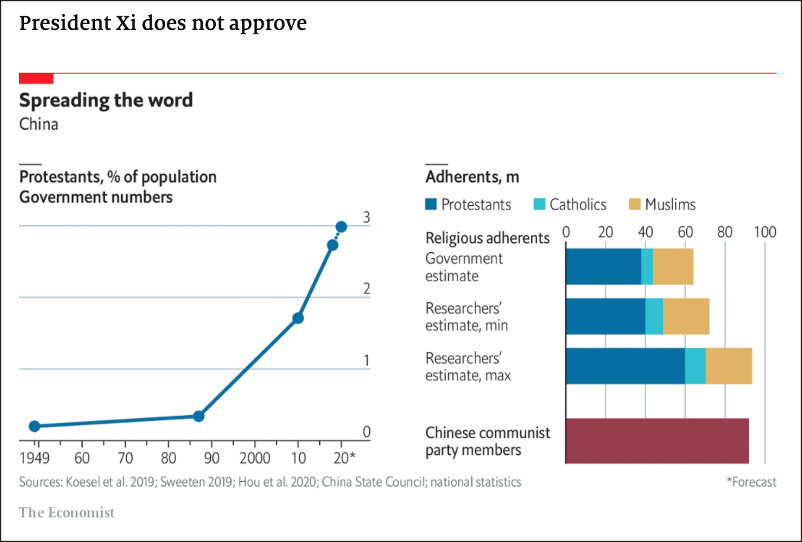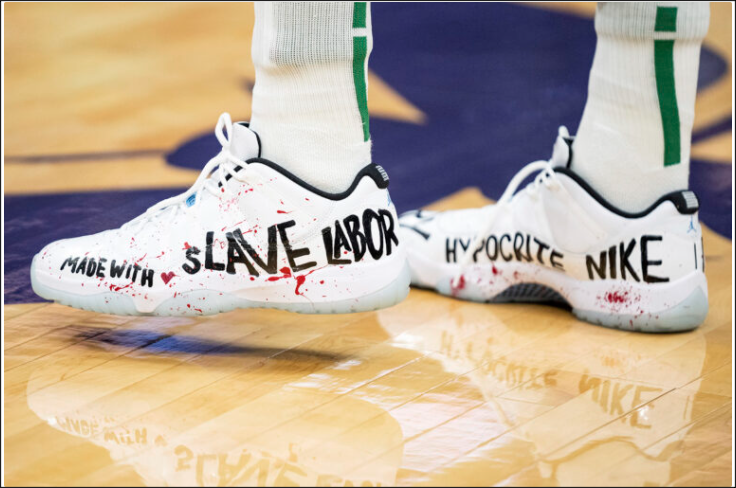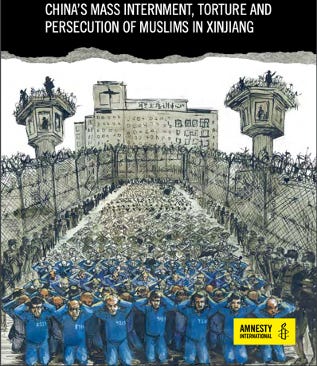From Panda Diplomacy to Facial Recognition
As the Olympics begins this week, it is critical for us to understand this is a different China. Unlike 2008, China is a surveillance state second to none. Dissent is not being tolerated.
In 1972, following the historic visit of Richard Nixon to their country, Chinese authorities made a goodwill gesture to the United States. They sent two giant pandas to the National Zoo in Washington, D.C. For the next two decades, Ling-Ling and Hsing-Hsing (pronounced ‘sing-sing’) enthralled Americans. The two were seen by over a million visitors in the first year alone.
The gift came at the height of China’s Cultural Revolution, a decade-long purge of all capitalistic and Western influences that killed millions of its own citizens. By the time of Nixon’s visit, the country’s economy had been ravaged and its leader, Chairman Mao Zedong, was in poor health. China repeated the gesture and gave gifts of these harmless and carefree animals to multiple countries. The practice became known as Panda Diplomacy. It allowed the Chinese Communist Party (CCP) to project a friendly image abroad. In the two decades that the pandas entertained visitors in D.C., China went through an economic transformation. China embraced elements of capitalism but retained centralized control by the CCP. The world was reminded that the CCP rules with an iron fist in 1989 as tanks rolled over students in the Tiananmen Square massacre. Ling-Ling died a few years later.
China needed a public relations reset. Olympics serve as a way for a country to showcase who they are and how far they have come. By 2008, China had become an economic powerhouse and the darling of Wall Street; but it still needed foreign investment. China remained far behind the West in terms of critical electronics and computing technology. The world’s opinion mattered if they were to catch up. Yes, the CCP held tight control, but they were benevolent. A little centralized planning was needed to pull a billion people out of poverty and become a modern nation.
This week, the Olympics are being held in Beijing for a second time in 14 years. In those intervening years, China has become a global technology leader. Today China doesn’t care what we think, only what people say. For those willing to look past the show, the iron fist is on display. They have combined their technology leadership with that ever-pervasive authoritarianism to create a surveillance state accountable to no one and second to none. Persecution against Christians has reached new levels. An extermination of the Uyghur culture and people is underway in western China. Through cameras, phone apps, and surveillance algorithms, the CCP is watching and listening. Even the athletes are being surveilled.
Surveillance is nothing new when it comes to religious persecution
Christianity has been under threat in the People’s Republic of China (PROC) since its founding in 1949. The prior leaders believed in a free China and religious tolerance but were forced to retreat to the island of Formosa, creating modern day Taiwan. The People’s Republic ruled by the CCP does not acknowledge Taiwan as its own country, but rather a renegade province that they have yet to reign in. Internationally, formal recognition is not allowed either. This makes for an awkward presence of Taiwanese athletes at Olympic games, who participate under the name of “Chinese Taipei.”
Efforts to extinguish Christianity in China has been commonplace for the past seventy years. Yet, the church has only grown. Not just in terms of absolute numbers but also as a percent of the population. Youth With A Mission (YWAM) estimates that there are nearly eight times as many Christians in mainland China as there are in Taiwan. Protestants, in particular, are surging in number. The World Atlas ranks China as the country with the third most Protestants at 58 million. According to The Economist magazine, China’s leader Xi Jinping is none too pleased. China is home to one of the fastest growing Christian churches.
Following the Cultural Revolution which ended in 1976, believers had a choice between state-sanctioned churches and house churches. For Protestants, the Three-Self Church is the sanctioned option, offering legal congregating but public allegiance to the government is also required. House churches have been independent and biblically based. While illegal, house churches tended to be tolerated by local authorities for decades, provided they remained small and quiet. Now neither are safe.
Chinese Law protects religious freedoms of its citizens provided they stay within the bounds of acceptable practices. According to International Christian Concern (https://www.persecution.org/), the definition of ‘acceptable’ has been changing since 2015 as the CCP tightens what it means to be Chinese. All religions are seen as representing foreign influences and allegiances. Those believed to be Christians must prove their allegiance to the party. Loyalty over faith is demand just as was demanded of Daniel and his friends in the days of Nebuchadnezzar.
Under Xi Jinping, persecution of Christianity has escalated dramatically by targeting both house churches and the Three-Self Church. Just one example is the 2019 imprisonment of Wang Yi for speaking out against the religious persecution. Pastor Yi published A Joint Statement by Pastors: A Declaration for the Sake of the Christian Faith, signed by more than 400 pastors. In short, the statement declared the Bible is the Word of God and stated that Christian churches are willing to obey Chinese authorities as this is ordained by God. They only stipulated that Christians “must proclaim Christ as the sole head of the church.” For this effort, he was thrown in prison and has been languishing in terrible conditions there since. His wife has been under residential surveillance. All her movements are being watched. Interactions with others puts them at risk, effectively leaving her in a state of house arrest thanks to the escalating use of surveillance technology.
But add technology into the mix and you can imprison an entire region
The best way to understand the threat of the sophisticated Chinese surveillance state is to look at the Uyghur people. The western most province of Xinjiang is a desert region roughly the size of Alaska, bordering Mongolia and Kazakhstan. It is home to 13 million Uyghur people. The Uyghurs are Muslims of Turkish descent. Anywhere between one million to three million of them now live in detention facilities.
Initially, the CCP denied such facilities existed but with 385 (and counting) of these camps and satellite technology being what it is, their presence was easy to prove. China now calls these reeducation camps but there are credible testimonies of forced labor, torture, and rape in these places. According to Australia’s Xinjiang Data Project that has set out to document the atrocities there, the CCP works hard to present a different image to the world. “Since early 2020, there’s been a stark increase in the Chinese Government and state media’s use of US social media networks to push alternative narratives and disinformation about the situation in Xinjiang to distract from such abuses.”
Sports exemplify this influence. The NBA, for whom China is a major source of revenue, learned not to cross Beijing during the 2019 democracy protests in Hong Kong. One general manager tweeted his support for protesters and economic consequences rained down on that team and the NBA. You should expect NBC to be largely silent on the issue of the Uyghurs during their broadcasts except for maybe a passing mention of it as a complicated issue.
It takes outsiders to speak up. Bob Costas stepped away after 24 years of Olympic broadcasts and can now speak freely. He claims that the Olympic Organizing Committee (IOC) deserves “shame and disgust” for holding the games again in China given the known human rights abuses. Olympic broadcasters who have taken over from Costas are keeping quiet, but their actions speak for themselves. They won’t be in Beijing. They have chosen to report from their studios in the US.
One sports figure is speaking out. That voice belongs to Enes Kanter Freedom, the center for the Boston Celtics. Kanter changed his name, adding the word Freedom when he became a US citizen at the end of last year. In the runup to the Olympics he has become outspoken about the genocide in Xinjiang. He, too, is ethnically Turkish. He has called out the NBA and its corporate sponsors for their silence on the issue. Nike gets special attention. It is alleged that Nike benefits from Uyghur slave labor inside reeducation camps. When Olympic athletes receive their medals, they will be wearing Nike garb on the podium. Despite requests, Nike has refused to say where that apparel was manufactured. Enes Freedom has an opinion on that:
Sometimes it is hard to know which allegations are true but other times it is clear. Amnesty International has made the situation in Xinjiang clear for us in a 160-page report. They document the critical role technology plays in putting Uyghurs into these camps and keeping them there. They interviewed 55 people with firsthand accounts from inside these camps as well as another 65 people outside of the camps.
Here is an excerpt from that report:
“According to these [interviewed] people, the system of surveillance involves extensive, invasive in-person and electronic monitoring in the form of:
· biometric data collection, including iris scans and facial imagery;
· invasive interviews by government officials;
· regular searches and interrogations by ubiquitous security officers;
· “homestays” by government employees and cadres assigned to live with ethnic minority families;
· an ever-present network of surveillance cameras, including facial recognition cameras;
· a vast network of checkpoints known as “convenience police stations”; and
· unfettered access to people’s personal communication devices and financial history.
The information witnesses provided to Amnesty is consistent with what journalists, scholars, and other investigators have revealed about the government’s mass surveillance operation in Xinjiang.”
Increasingly, Chinese authorities are barring the use of instant messaging apps such as WhatsApp which they can’t monitor in favor of those like WeChat which they can.
Surveillance is not limited to their citizens
Of course, technological surveillance is limited to Chinese citizens. They wouldn’t do such things to the foreign athletes or journalists, right? Think again. They might be doing it already. The Citizen Lab is a cybersecurity research firm that seeks to understand how technology is being used against human rights. On a hunch, they analyzed and reverse engineered MY2022, an app mandated for use by all attendees of the 2022 Olympic Games in Beijing. This app contains medical, passport, and demographic information. Citizen Lab found that it contained security vulnerabilities that would allow the app to collect information from an athlete’s phone. They recommended bringing only a burner phone into China.
Among the concerns was a list of censorship words built into the app that could be used to flag and record audio if the app is left on in the background. The securities risks were highlighted and sent to the IOC and other Olympic-related authorities. Without addressing the risks or fixing the issues, the IOC has since pronounced the app safe for all use. With a panda on it, how can it be anything but safe?
News outlets in Europe and Japan have raised awareness on the app, but major media outlets in the US have been largely silent on this issue. The app is available for download in the Apple and Android stores. I won’t be downloading it to my phone.
In Conclusion
Friday’s opening ceremonies are certain to be a spectacle. The host country always puts on a good show. We need to remember that it is all a show. The days of Ling-Ling and Hsing-Hsing are long gone. Those days have been replaced by ones where apps listen for sensitive topics and cameras are equipped with facial recognition software to track your movements. Yet, fear not. God is in control. The Economist’s chart above just reminds us of what the Book of Acts already taught us. Persecution does not inhibit but rather stimulates church growth.
I don’t want to take away anything from the athletes. They didn’t choose the location of the Olympics. They deserve our respect and goodwill for the years of hard work to get there. Enjoy watching them. We just need to look past that spectacle and be praying for the Christians, Muslims, and non-religious Chinese that are enduring atrocities beyond our purview. As you are cheering on your favorite athletes, educate yourselves and your family members on the modern-day concentration camps and Christian persecution. History will not remember fondly those nations that, to make a buck or win a medal, turn a blind eye to the abuses of millions.
< Please share this article with others. >






